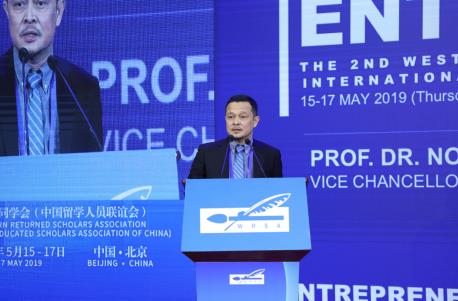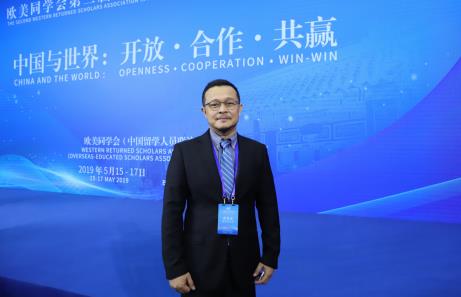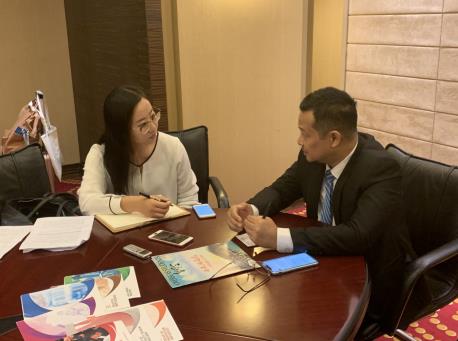
人物简介:
努阿智吉·伊斯迈尔,马来西亚吉兰丹大学现任校长兼主席,拥有英国拉夫堡大学会计信息系统博士学位。曾担任马来西亚教育部高等教育司副司长,马来西亚北方大学负责科研和创新的副校长兼该校高级商学院院长。曾获得创新领导力奖(2011年)、教育领导力奖(2013年)和最近的亚洲人力资源发展“最具影响力”奖(Asia HRD Awards)。
在欧美同学会第二届国际智库论坛暨首届菖蒲河论坛举办期间,本网记者采访了马来西亚吉兰丹大学校长努阿智吉·伊斯迈尔教授。努阿智吉教授认为中马之间友谊长存,中马友好关系将使中马教育合作受益。
他认为,吉兰丹大学需要加强和中国合作,我们希望通过教育领域的合作,深化中国与马来西亚、与吉兰丹州的关系,进一步带动吉兰丹州的经济发展。同时我们也希望中国大学可以来马来西亚进行交流,建立互利友好的双边交流也是我作为吉兰丹大学校长的任务和职责。

记者:马来西亚吉兰丹大学(即UMK)与中国旅马同学会合作,正在筹备成立一所“一带一路”商学院。请问这所商学院是中马合作的优秀成果吗?
努阿智吉:是的。首先,我要祝贺新中国成立70周年;其次,我谨代表马来西亚政府祝贺中国和马来西亚建交45周年。
我于2019年1月被任命为马来西亚吉兰丹大学的校长。吉兰丹大学是马来西亚吉兰丹州内的第一所公立大学,也是马来西亚的第19所公立大学。吉兰丹大学注重培养学生的创业精神,可以肯定地说,吉兰丹大学是马来西亚国内研究创业精神的顶尖大学。吉兰丹大学希望扩大与外国大学,尤其是中国大学的友好合作关系。这是我们与中国开展合作的第一个良好愿望。
记者:您曾经在马来西亚高等教育部工作,同时您也是商业专家。您对中马交流,尤其在教育和商业方面的交流有什么看法?
努阿智吉:好的,也许我可以谈一点。在此之前,我已经在马来西亚的大学里工作了25年;然后,我被借调到马来西亚高等教育部工作了近2年;再之后,我被派往吉兰丹大学担任校长。2009年,中国和马来西亚签署了一份谅解备忘录,之后在这份备忘录的指引之下,许多中国学生来到马来西亚留学,很多马来西亚的学生也来到中国留学。现在我们有大约4000名马来西亚学生在中国学习,其中北京外国语大学里就有很多马来西亚的留学生。
习近平主席提出了“一带一路”倡议,在马来语里,我们称之为“拉鲁苏特拉”。中国的“一带一路”倡议,让其他国家获得了分享繁荣和发展的宝贵机会。中马之间,在经济、技术领域,尤其教育领域,均拥有很多友好合作关系。我能够看到的是,中国在科学技术领域的发展已经非常先进,现在中国是世界第二大经济体,未来还将获得持续长足发展。因此,马来西亚与中国合作,诚挚地希望加入这个获取“一带一路”共同繁荣的宝贵机会。
吉兰丹大学位于马来西亚半岛东海岸的吉兰丹州。吉兰丹大学希望成为吉兰丹州乃至马来西亚发展的催化剂。作为一名教商业和信息技术的大学教授,我认为吉兰丹大学和吉兰丹州政府与中国的合作非常重要。我们希望看到,我们之间继续拥有良好的合作关系。我们也希望,吉兰丹和马来西亚的商人们来中国,也邀请中国商人和大学来马来西亚投资,以促进双边关系,使我们都能从这些友好关系中受益。
记者:习近平总书记在“一带一路”国际合作高峰论坛开幕式上的演讲中指出,要推动教育合作,扩大互派留学生规模,提升合作办学水平。那么,您对未来中马教育合作的长期愿景是什么?
努阿智吉:我去过很多国家,有些国家我还去过两次,甚至更多。我也来过中国很多次。在中国,我从不会感到无聊,我不断地希望:我要再来中国。每次来中国,我总能学到新东西,尤其是新技术。而且,我在中国还有很多好朋友。
当我还是马来西亚北方大学高级商学院的院长时,我便已经拥有了许多来自中国优秀商学院的朋友们。我总是对他们的快速发展感到惊讶,我可以看到他们还有很多的发展潜力。认识这些朋友并与之合作,令我倍感荣幸。
中国和马来西亚的大学也可以在很多方面开展合作。例如,我今年二月份来中国时,吉兰丹大学和中国农业大学签署了一份备忘录。两个月后,我们派五名研究人员携带十二种产品签约并参加了在北京举办的国际现代农业展览会。我们的产品都卖完了,直到现在还在持续接受大量订单,这些订单的数量看起来有点疯狂。
鉴于此,我已经和吉兰丹州政府谈过了,我对他们说,中国的农业很不同,中国拥有智慧农业,马来西亚可以向中国学习。事实上,中国农业大学已经同意派人来吉兰丹大学参访,我将带他们去和吉兰丹州政府谈一谈具体的合作事宜。
如何提高我们双方的农业生产率,这始终是一个双赢合作。我们向中国学习某些东西,中国也可以向马来西亚学习一些东西,因为有些产品在中国没有,所以我们便具备了某些优势。
我认为,未来我们还可以做很多事情。由中国投资、已经在建的马来西亚东海岸铁路线(ECRL)进展顺利。我现在还希望和中国华为公司谈一谈合作,华为拥有全世界最顶级的5G技术,他们让世界更快的联通。也许几年后,中国的学生们将花费有限的时间在马来西亚学习,反之亦然。可能是一半对一半,一半时间在中国学习,另一半时间在马来西亚学习,我们只需要使用视频会议系统,就可以同步授课。马来西亚的学生也可以在线跟随并学习中国教授们的课程。5G让信息传递非常快,一切都没有问题。
所以我认为世界会在五到十年内变化很快,空间距离将不再是一个大问题。有了5G技术,我们就可以通过更快的网络系统进行在线沟通与协作。届时,即使像吉兰丹大学这样的小型大学也可以梦想成真。
因此我坚信,未来的关键当然是合作。我们不必竞争。我们应该相辅相成。我认为那才是我们的未来。
英文采访实录:
Q=记者
A=吉兰丹大学校长(Dr.Noor Azizi Ismail)
Noor Azizi Ismail:
I Believe a Long-term Friendship Between China and Malaysia
Guest Introduction:Noor Azizi Ismail, Vice Chancellor & President, University Malaysia Kelantan.
During the 2nd Western Returned Scholars Association (WRSA) International Think Tank Forum & Changpu River Forum, Overseas Students Magazine interviewed Professor Dr. Noor Azizi Ismail, talked about education and relations between China and Malaysia. The following is our interview transcript:
Q: UMK has established a Belt & Road Business School. Is this business school an excellent result of China-Malaysia cooperation?
A: Yes, at first I want to congratulate China for its 70th anniversary of the founding of the People’s Republic of China. The second congratulation is from Malaysia to celebrate its 45th anniversary of Malaysia and China’s friendly relations.
I was recently appointed as president of University Malaysia Kelantan, or UMK. UMK is one of the public universities in Malaysia. We currently have twenty public universities thus far. UMK focuses on entrepreneurship. It’s safe to say UMK is the top university for studying entrepreneurship in Malaysia. And UMK hopes to expand its cooperation with foreign universities, especially universities in China. And this is our first hope to collaborate with China.
Q: We knew that you once worked in the Ministry of Education and you’re also an expert in business. What’s your understanding of China-Malaysia communications, especially in education and business?
A: Okay, maybe I can speak a bit about it. Before this I’ve been in the university for 25 years. Then I was borrowed to work for the ministry of High Education for almost two years, and then I was sent to be president of UMK. What I saw was that china and Malaysia signed a MoU in 2009, and then MRA, Mutual Recognition Agreement, after that many Chinese students came to Malaysia and Malaysian students went to China. Now we have roughly 4000 students studying in China and also at BFSU.
As President Xi Jinping, via the Belt and Road Initiative, or as we call it“Laluan Sutera” in Malay, China proposed this initiative so that other countries can share in prosperity and opportunity. Many are about economy, technology and most importantly education. Then what I see is that China has been advanced in science and technology and now is the world’s second largest economy, and might even be the top economy in the coming years. So Malaysia wants to join in this shared future of mankind.
UMK is located in Kelantan, a state in the East Coast of Peninsula Malaysia. UMK plays a significant role as the catalyst to the socio-economic development of Kelantan as well as Malaysia. I see this as a professor in business and information technology, I think it’s important that UMK as well as the state government together collaborates with China. We want to see that we have good relations. We hope businessmen form Kelantan and Malaysia go to China, and also invite Chinese businessmen and universities to invest in Malaysia to boost bilateral relations, so that we can all benefit from these relations. This is my view as president of UMK.
Q: In his speech at the opening ceremony of the“Belt and Road” International Summit Forum, President Xi Jinping pointed out that it is necessary to promote educational cooperation, expand the scale of exchange of international students, and improve the level of cooperation in running schools. So what is your long term vision for China-Malaysia educational cooperation in the future?
A:Yeah, I’ve been to many countries and some countries I have went twice or more. I came to China many times. I never get bored and I want to come again. There are always new things I can learn especially new technologies. I also have many good friends in China.
When I was Dean of business school, I have many friends from good Chinese business school and I’m always amaze with how far they works, and I can see that they have a lot of potentials and it is good to know and collaborate with them.
The Malaysia and China can work together. For example, I came here in February; we signed the MoU with China Agriculture University. And two months after that, we sent five researchers with twelve products to attend the International Modern Agriculture Exhibition in Beijing. And the products are all sold out, we will see all these crazy orders now. We don't know how we're going to produce big, very hot booth. And I’ve been talking to the state governments. I said agriculture in China is different. They have very smart agriculture. We can learn from them. And actually, CAU has agreed they'll gonna come to UMK. I’m going to bring them to talk with the state government. How can we improve productivity of our farming and that's always a win-win cooperation.
We learn certain things from China and China also learn from Malaysia, because there are certain products that you don't have in China, we have certain advantages.
I think there are so many things we can do. With ECRL (the East Coast Railway Link), I think and the technology talking about with Huawei who is the champion of 5G, the fifth generation of internet, connectivity is not a problem. Probably in a few years from now on, the students don't have to travel too much to Malaysia, and vice versa. Probably half to half, half of the time you spend in China and other half in Malaysia, we just use the video conferencing system, because it's very fast now. And Malaysia can also learn to follow the lectures of a professor in China. So there's no issue.
So I think the world is gonna change very fast in five or ten years, and distance is not going to be a big problem. So even small universities can dream big, because of the connectivity, with the connectivity we can collaborate.
I think the key to the future is collaboration. We don't have to compete. We should complement each other. So I think that's our future.

本网记者采访努阿智吉(右)
